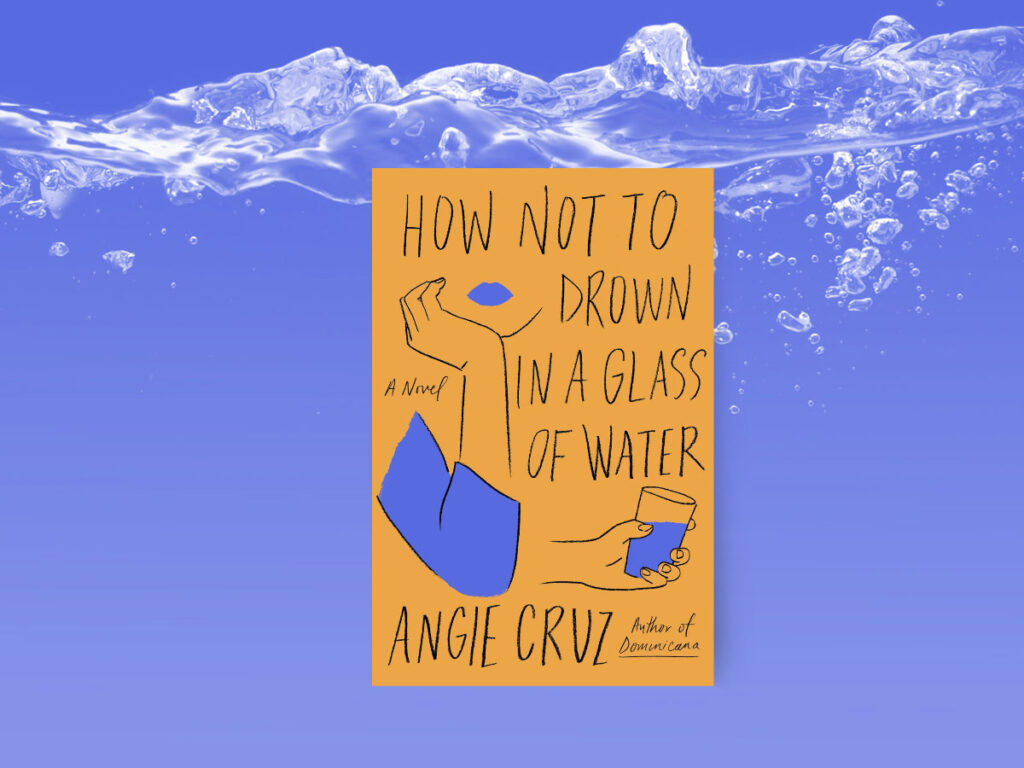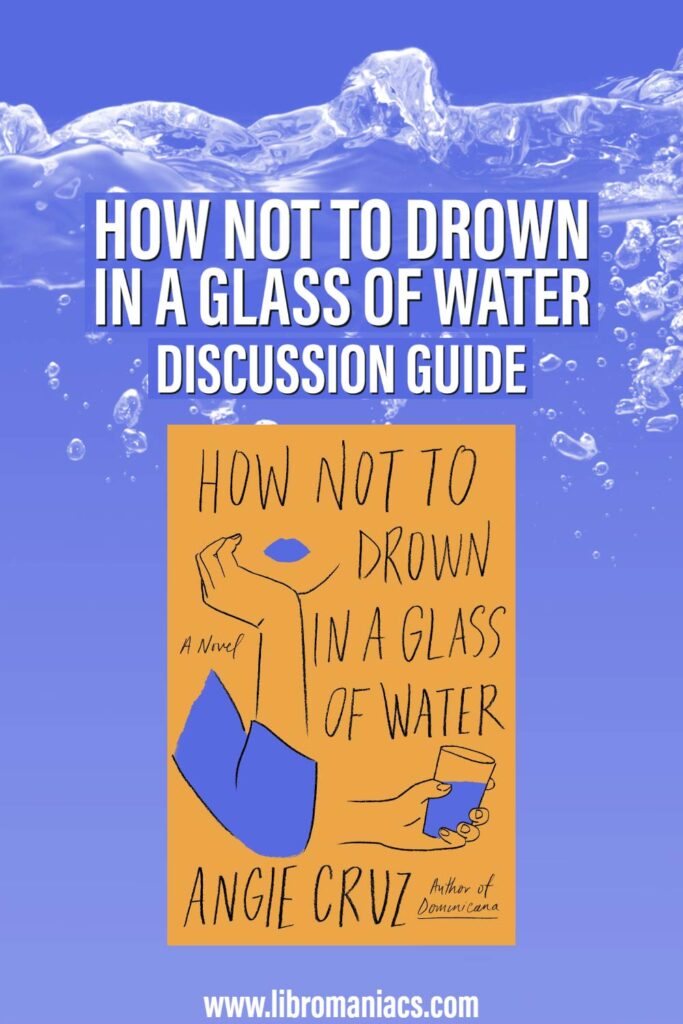“Desahogar: to undrown, to cry until you don’t need to cry no more.”
This is exactly what Cara Romero is trying to do as she talks her way through her 12 mandatory job counseling sessions. But boy oh boy, she does have some stuff to cry about. Cara’s got no job, aging friends, an exasperated sister, an estranged son, and a slim grip on her rent controlled apartment. But despite all that she’s surely not lacking in pluck.
Angie Cruz delivers Cara’s story in a unique format as she covers themes like gentrification, economic fragility, found family, fraught family, domestic abuse and the immigrant experience. Use our How Not to Drown in a Glass of Water book club questions to help your discussion group tease out these themes and examine Cara’s narrative.
This How Not to Drown discussion guide includes a book synopsis, 10 book club questions and some selected reviews– all of which will help you get the conversation started and keep it going.
And if you liked Cara’s story, or the book’s unusual formatting, scroll down for three related reads to add to your TBR pile.

(This article contains affiliate links. This means that if you choose to purchase, I’ll make a small commission.)
How Not to Drown in a Glass of Water Synopsis
(We always chose to provide the publisher synopsis because we feel that it’s worthwhile to discuss whether the official book description actually squared with your experience of the book.)
How Not to Drown in a Glass of Water, Angie Cruz
Cara Romero thought she would work at the factory of little lamps for the rest of her life. But when, in her mid-50s, she loses her job in the Great Recession, she is forced back into the job market for the first time in decades. Set up with a job counselor, Cara instead begins to narrate the story of her life. Over the course of twelve sessions, Cara recounts her tempestuous love affairs, her alternately biting and loving relationships with her neighbor Lulu and her sister Angela, her struggles with debt, gentrification and loss, and, eventually, what really happened between her and her estranged son, Fernando. As Cara confronts her darkest secrets and regrets, we see a woman buffeted by life but still full of fight.
10 How Not to Drown in a Glass of Water Book Club Questions
These questions have been tailored to this book’s specific reading experience, but if you want more ideas, we also have an article with 101 generic book club questions.
- The book’s chapter formatting was unusual, using the case worker appointments to frame the story, and the interstitial job applications, emails and invoices to offer insight into Cara’s journey. Did that format work for you? What did you like/dislike about it?
- Cara’s job loss surfaced the many difficulties that certain populations face in a tough job market. She’s an immigrant, not even high school educated, 56 years old, a woman, and living in a precariously rent-controlled apartment in one of the most expensive real estate markets in the nation.
Have you or your friends and family members ever experienced this sort of economic vulnerability? Can you relate to Cara’s predicament? - Cara’s dialogue is punctuated with a lot of Spanish, or rather Spanglish. How familiar are you with Spanish and how did your knowledge (or lack thereof) affect your ability to understand and appreciate the story?
- In one of her early case worker appointments, Cara says “Cara Romero is strong. Write that down!” Do you agree? How strong is Cara and in what ways is she vulnerable?
- One of Cara’s frequent Spanish phrases is “punta final”. It literally means final point, or more colloquially “that’s that” or “end of story”. The phrase speaks to her opinionated character.
How does that aspect of her character help her and how does it hurt her? - At one point Cara talks about self-sabotage, saying that “We step in s**t on purpose so that we have to buy new shoes.” What are some ways that she does that very thing to herself and how self-aware is she of her own behavior?
- At times throughout Cara’s story, she is clearly drowning in a glass of water, and at other times she’s treading water. Have there been moments in your life like that?
- Cara’s father told her “The less you say, the more people listen”. And yet, Cara’s pretty voluble. Were people listening to her, or were they tuning her out?
- The case worker was like one of the adults from an old Peanuts cartoon, there sure, but not seen or heard. You just get Cara’s reactions to her. What do you think the case worker thinks of Cara?
- Pick a few of Cara’s relationships and discuss their dynamic. Such as the relationship between Cara and her son, sister, Lulu, or the elderly neighbor.
Selected Reviews for How Not to Drown in a Glass of Water
“This brutally honest lady tells it all, leaves no stone unturned. And what a story it is. I am sure it is unlike any the counselor has ever heard […] Angie Cruz has written a delightfully innovative novel about this warm, lovable lady who survives so much and yet remains hopeful. You can read this for its laugh out loud humor alone, and/or you can reflect on the brokenness of some of our governmental programs. Whichever, it is a very worthwhile and pleasurable read.”
“We hear her thoughts and conversations through Cara’s monologues. Unfortunately for me, I would have preferred to hear real dialogue with the other characters in the story. Cara’s family and friends are a colorful bunch. It would have been interesting also, to hear the young counselor’s reactions to Cara.”
“I found that the unique setup of this book worked. It’s rare that a novel told in second person doesn’t feel gimmicky to me, yet with this novel, Cara’s voice came across as authentic, funny, and full of energy. I think Angie Cruz’s use of vivid details and her consistency with the way Cara described both external events and her own emotions helped the book come alive.”
“Once she started telling stories of how she treated her son, it became hard for her positive qualities to outweigh the negative. To my mind, the story almost mocked the immigrant experience.”
3 Books Like How Not to Drown in a Glass of Water
For more book club guides that feature the immigrant experience- try A Woman is No Man, Solito and Erotic Stories for Punjabi Widows. For more characters from the Caribbean, try our guide for Next Year in Havana and our whole list of books set in Cuba.

On Earth We’re Briefly Gorgeous, Ocean Vuong
Longlisted for the National Book Award, this haunting novel is told in the form of a letter and series of vignettes from a son to his illiterate mother. “Little Dog” talks about frankly about race, gender, sexuality, masculinity, grief and above all language– such as the unspoken words between a mother and son and how language and literacy confer power.
You get the backstory of he and his mother’s immigrant experience, his poignant relationship with his mother and grandmother, and his painful coming of age (and coming out).
This is a great comp if you want more on the immigrant experience and difficult mother/son relationships.

A Visit From the Goon Squad, Jennifer Egan
When you listen to live music, it exists in that moment, and you can never again recapture in the same exact way. And like that, this book deals with how we can never recapture who we were in the past– we are tied to who were were, but we cannot recover our former selves.
The series of stories revolve around dead record producer Bennie Salazar…and the people who knew him, including his klepto assistant, Sasha. Like How Not to Drown, the narrative is not linear, some of it takes place in New York, and aspects of it are told in a non-traditional writing format. But unlike Cara’s narrative, you get points of view from the other characters.

Broke in America: Seeing, Understanding and Ending US Poverty, Joann Samuel Goldblum and Colleen Shaddox
Cara is hanging on economically by a very frayed thread.
This non-fiction book takes a hard look and the breadth and depth of poverty in America. The authors discuss some of the systematic problems and generational poverty cycles that get and keep people impoverished. They take the mystery out of this seemingly intractable problem and share specific instances about how things like water, energy and housing affect poverty. Each section also offers some actionable steps that any individual can take to help those in poverty.
Share these How Not to Drown in a Glass of Water book club questions with your friends:

